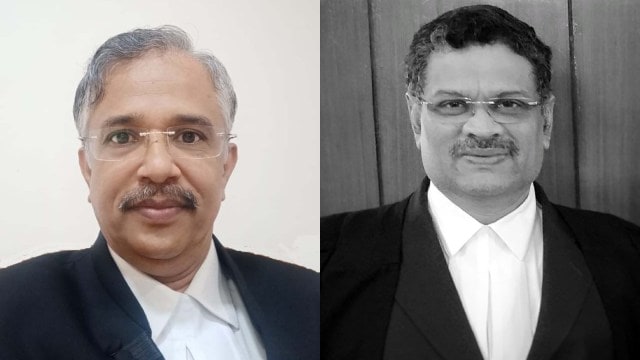‘Ambedkar had said if not for BN Rau, Constitution would’ve taken 25 more yrs’: HC judge at Brahmin convention
The two judges are not new to controversies. In 2020, Justice Dixit had made a controversial statement while granting bail to a rape accused.
 Justices V Srishananda and Krishna S Dixit (Photo: karnatakajudiciary.kar.nic.in)
Justices V Srishananda and Krishna S Dixit (Photo: karnatakajudiciary.kar.nic.in)Two Karnataka High Court judges participated in an event to mark the golden jubilee of the ‘Akhila Karnataka Brahmana Mahasabha’ in Bengaluru. Justices V Srishananda and Krishna S Dixit were among the key speakers at ‘Vishwamitra’, the two-day Brahmin convention held on January 18-19.
In his speech, Justice Dixit said the term “Brahmin should not be an indication of caste but varna”. Vedavyasa who divided the Veda (into four Vedas) was the son of a fisherwoman and Valmiki who wrote the Ramayana was from either an SC or an ST. Have we (Bramhins) looked down on them? We have worshipped (Lord) Rama for centuries and the values have been incorporated into the Constitution.”
He also highlighted the contributions of Brahmins in drafting the Constitution. “Of the seven members (in the drafting committee), three were Brahmins — Alladi Krishnaswamy Iyer, Gopalaswami Ayyangar and B N Rau… Dr B R Ambedkar once said at Bhandarkar Institute that if B N Rau had not readied the draft of the Constitution, it would have taken another 25 years (to be framed),” Justice Dixit said.
“Before becoming a judge, I was identified with non-Brahmin nationalist movements. After I became a judge, I retired from all other activities… As a judge, I have certain limitations and I am speaking keeping it in context,” he said.
Speaking at the event, Justice Srishananda said such events have to be organised to “discuss their (community) issues”. “Many people ask what is the need of such a grand event when many people struggle for two meals a day or to pay for education… But these events must be organised to get everyone together and to discuss their issues… why shouldn’t such events be organised,” he asked.
The two judges are not new to controversies. In 2020, Justice Dixit had made a controversial statement while granting bail to a rape accused. Following criticism from lawyers and activists, the observation was later expunged.
Justice Srishananda also courted controversy last year when he compared a Muslim-majority area with “Pakistan”. Later, the Supreme Court took up suo motu proceedings and said, “We can’t call any part of the territory of India as Pakistan.” After Justice Srishananda tendered an apology, the proceedings were closed.







